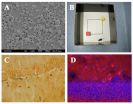Positive subliminal messages on aging improve physical functioning in elderly
Nobelist's new technique provides 3-D images of subcellular activity in real time
2014-10-20
(Press-News.org) Older individuals who are subliminally exposed to positive stereotypes about aging showed improved physical functioning that can last for several weeks, a new study led by the Yale School of Public Health has found.
Researchers used a novel intervention method to examine for the first time whether exposure to positive age stereotypes could weaken negative age stereotypes and their effects over time, and lead to healthier outcomes.
The study, to be published online in an upcoming issue of the journal Psychological Science, consisted of 100 older individuals (average age 81 years) who live in the greater New Haven, Connecticut area. Some of the participants were subjected to positive age stereotypes on a computer screen that flashed words such as "spry" and "creative" at speeds that were too fast to allow for conscious awareness.
Individuals exposed to the positive messaging exhibited a range of psychological and physical improvements that were not found in control subjects. They benefited from improved physical function, such as physical balance, which continued for three weeks after the intervention ended. Also, during the same period, positive age stereotypes and positive self-perceptions of aging were strengthened, and negative age stereotypes and negative self-perceptions of aging were weakened.
"The challenge we had in this study was to enable the participants to overcome the negative age stereotypes which they acquire from society, as in everyday conversations and television comedies," said lead researcher Becca Levy, associate professor and director of the Social and Behavioral Science Division. "The study's successful outcome suggests the potential of directing subliminal processes toward the enhancement of physical function."
While it has been previously shown by Levy that negative age stereotypes can weaken an older individual's physical functioning, this is the first time that subliminal activation of positive age stereotypes was found to improve outcomes over time.
The study found that the intervention influenced physical function through a cascade of positive effects: It first strengthened the subjects' positive age stereotypes, which then strengthened their positive self-perceptions, which then improved their physical function.
The study's effect on physical function surpassed a previous study by others that involved a six-month-exercise intervention's effect with participants of similar ages.
INFORMATION:
The research was supported by grants from the National Institute on Aging; National Heart, Lung and Blood Institute; and the Patrick and Catherine Weldon Donaghue Medical Research Foundation. The research team also included Corey Pliver of the Yale School of Public Health, Martin Slade of the Yale School of Medicine, and Pil Chung of the University of California, Berkeley.
Citation: Psychological Science: doi: 10.1177/0956797614551970
ELSE PRESS RELEASES FROM THIS DATE:
2014-10-20
Antibiotics—one of modernity's great success stories—are charms that come with a curse. Their overuse in human and animal populations can lead to the development of resistant microbial strains, posing a dire threat to global health.
In a new study, Hansa Done, PhD candidate, and Rolf Halden, PhD, researchers at Arizona State University's Biodesign Institute, examine antibiotic use in the rapidly expanding world of global aquaculture.
Done and Halden measured the presence of antibiotics in shrimp, salmon, catfish, trout, tilapia and swai, originating from ...
2014-10-20
This news release is available in German. Physical exercise in old age can improve brain perfusion as well as certain memory skills. This is the finding of Magdeburg neuroscientists who studied men and women aged between 60 and 77. In younger individuals regular training on a treadmill tended to improve cerebral blood flow and visual memory. However, trial participants who were older than 70 years of age tended to show no benefit of exercise. Thus, the study also indicates that the benefits of exercise may be limited by advancing age. Researchers of the German Center ...
2014-10-20
ATLANTA (October 20, 2014) – New data presented today indicate that consumers of frozen meals (1) had higher daily intakes of dietary fiber, potassium, calcium and protein, and lower daily intakes of calories and saturated fat than consumers of quick service restaurant (QSR) meals (2). The poster, Consumption of Frozen Meals as Compared to Quick Service Restaurant Meals is Associated with Better Nutrient Intakes in Adult Participants of The National Health and Nutrition Examination Survey (2003-2010), was presented at the 2014 Academy of Nutrition and Dietetics Food ...
2014-10-20
Boulder, CO, USA — Ryan McKellar's research sounds like it was plucked from Jurassic Park: he studies pieces of amber found buried with dinosaur skeletons. But rather than re-creating dinosaurs, McKellar uses the tiny pieces of fossilized tree resin to study the world in which the now-extinct behemoths lived.
New techniques for investigating very tiny pieces of fragile amber buried in dinosaur bonebeds could close the gaps in knowledge about the ecology of the dinosaurs, said McKellar, who is a research scientist at the Royal Saskatchewan Museum in Saskatchewan, ...
2014-10-20
New Rochelle, NY, October 20, 2014—When it comes to picking an egg donor, until recent years, recipients tended to prefer someone with a similar appearance. Donor trait choices are changing, though, and which traits are now more preferable and why is the focus of "Beauty, Brains or Health: Trends in Ovum Recipient Preferences," an article published in Journal of Women's Health, a peer-reviewed publication from Mary Ann Liebert, Inc., publishers. The article is available free on the Journal of Women's Health website at http://online.liebertpub.com/doi/full/10.1089/jwh.2014.4792 ...
2014-10-20
Boulder, CO, USA — Venus is hiding something beneath its brilliant shroud of clouds: a first order mystery about the planet that researchers may be a little closer to solving because of a new re-analysis of twenty-year-old spacecraft data.
Venus's surface can't be seen from orbit in visible light because of the planet's hot, dense, cloudy atmosphere. Instead, radar has been used by spacecraft to penetrate the clouds and map out the surface – both by reflecting radar off the surface to measure elevation and by looking at the radio emissions of the hot surface. ...
2014-10-20
This news release is available in Spanish.
Enara Herran, a researcher at the UPV/EHU's Department of Pharmacy and Pharmaceutical Technology, is working to improve the way Alzheimer's and Parkinson's treatments are administered. And it is a fact that, as Herran herself stressed, "both diseases are becoming more and more common in our society".
Both disorders affect the neurones: their structure and function is lost, and this in turn leads to the deterioration in the patient's motor, cognitive, sensory and emotional functions. As Herran pointed out, in many cases ...
2014-10-20
VIDEO:
The Internet "sleeps " -- but not everywhere. Find out why.
Click here for more information.
Researchers studying how big the Internet is have found that it "sleeps," almost like a living creature.
The finding will help scientists and policymakers develop better systems to measure and track Internet outages, such as those that struck the New York area after Hurricane Sandy. Understanding how the Internet sleeps will help them avoid confusing a sleeping Internet with ...
2014-10-20
Fish just want to have fun, according to a University of Tennessee, Knoxville, study that finds even fish "play."
The research is published in the academic journal Ethology and can be viewed at http://bit.ly/1tLunpC.
Gordon Burghardt, a professor in the departments of Psychology and Ecology are Evolutionary Biology, is known for defining "play" in a way that allows us to identify it in species not previously thought capable of play, such as wasps, reptiles and invertebrates.
"Play is repeated behavior that is incompletely functional in the context or at the age ...
2014-10-20
This news release is available in German. Diatoms play an important role in water quality and in the global climate. They generate about one fourth of the oxygen in the Earth's atmosphere and perform around one-quarter of the global CO2 assimilation, i.e. they convert carbon dioxide into organic substances. Their light receptors are a crucial factor in this process. Researchers at the Leipzig University and the Helmholtz Centre for Environmental Research have now discovered that blue and red light sensing photoreceptors control the carbon flow in these algae. These ...
LAST 30 PRESS RELEASES:
[Press-News.org] Positive subliminal messages on aging improve physical functioning in elderly
Nobelist's new technique provides 3-D images of subcellular activity in real time





